Alguém tem como sonho ser uma estrela da Broadway.
Outra pessoa quer montar um show
musical. Há um interesse amoroso, confusão, mal-entendido, uma pouco de drama,
um monte de músicas. Eu acabei de descrever todos os musicais já feitos – ou pelo menos boa parte deles? Não importa: para nós, que somos loucos por
musicais, a história pode ser a mesma, o final previsível, a maneira como os
personagens começam a cantar do nada pode ser até inacreditável. Nós não nos
importamos. Os musicais não foram feitos para serem analisados como obras de
arte filosóficas e complexas. Eles foram feitos para despertar nossos
sentimentos, nos alegrar e nos fazer sorrir. E que sorriso a “Melodia da
Broadway de 1940” é capaz de gerar em nós!
Someone has the dream to make it big on Broadway.
Someone else wants to put on a show. There is a love interest, confusion,
misunderstandings, a little drama, a lot of music. Have I described all
musicals ever made – or at least a good part of them? It doesn't matter: for
us, who are mad about musicals, the story may be the same, the ending
predictable, the bursting-into-song situation unbelievable. We don't care.
Musicals were not made to be analyzed as complex philosophical work of arts.
They were made for us to feel, to enjoy, and to smile. And what a smile does
“Broadway Melody of 1940” brings to our faces!
Johnny Brett (Fred Astaire) e King Shaw (George
Murphy) são dois dançarinos que sonham em se apresentar na Broadway. Por
enquanto, eles se apresentam em um simples salão, e lá são vistos por Bob Casey
(Frank Morgan). John acredita que Bob é um cobrador, e por isso diz que se
chama King Shaw. O sócio de Bob Casey, Bert Matthews (Ian Hunter), convida Shaw
para um teste para ser o parceiro de dança de Clare Bennett (Eleanor Powell).
Shaw é bem-sucedido no teste, e não sabe que John está apaixonado por Clare
Bennett.
Johnny Brett (Fred Astaire) and King Shaw (George
Murphy) are two dancers dreaming about making it big on Broadway. They present
an act in a simple ballroom, when they are spotted by Bob Casey (Frank Morgan).
John believes Casey is a bill collector, so he says his name is King Shaw.
Casey's business partner, Bert Matthews (Ian Hunter), invites Shaw for an
audition to be Clare Bennett´s (Eleanor Powell) dance partner. Shaw succeeds in
the audition, without knowing that John is in love with Clare Bennett.
Muitos artistas querem assinar um contrato com
Matthews e Casey, incluindo uma jovem malabarista, um rapaz com um monociclo, e
um casal que faz um número que seria um sucesso com as plateias do vaudeville
de 1910 – e todos estes são considerados por Casey “a maior descoberta da vida”
dele!
Many artists want to sign a contract with Matthews and
Casey, including a young juggler, a guy in a one-wheel vehicle, and a man and
woman act that would be great for a 1910 vaudeville audience – and all are
called by Casey “the greatest discovery of his life”!
Mas John não se incomoda. Ele é o melhor dos
melhores amigos, e realmente deseja que Shaw tenha êxito. John ensaia com Shaw,
lhe dá conselhos, inventa desculpas quando John pisa na bola e também recorta
notícias de jornal que mencionam Shaw para fazer um livro de recortes. Shaw é um
bom dançarino, mas ele também adora se divertir e não leva o trabalho muito a
sério – ou pelo menos ele não tem a mesma paixão pela dança que John.
But John doesn't care. He is the best of best friends,
and he truly wishes Shaw is successful. John rehearses with Shaw, gives him
advice, covers for him when he screws up and also cuts all newspaper notes that
mention Shaw for a scrapbook. Shaw is a good dancer, but he also loves to have
fun and doesn't take his job very seriously – or at least doesn't have the same
passion for dancing that John has.
É adorável ver Fred Astaire agir como bobo
apaixonado. Ele é jovial, gentil, e faz com que todos os passos de dança
pareçam fáceis. Ele é como um rapaz se apaixonando pela primeira vez – e nós
acreditamos nisso, mesmo Fred Astaire tendo 40 anos de idade quando o filme foi
gravado! E ele nem aparenta estar intimidado por Eleanor Powell, algo que ele
realmente estava: então com 27 anos, Eleanor já era considerada “a melhor
sapateadora do mundo”, e Fred acreditava que ela poderia ser melhor que ele.
Eleanor, aliás, fez três dos quatro filmes da série “Melodia da Broadway” – em
1936, 1938 e 1940.
It's lovely to see Fred Astaire making a fool of
himself because he is in love. He is youthful, suave and makes all his dance
steps look easy. He is like a young boy, falling in love for the first time –
and we believe in him, even though Fred was 40 when the film was shooting! And
he doesn't even show that he was actually intimidated by Eleanor Powell: then
at age 27, Eleanor was already considered “the greatest feminine tap dancer in
the world”, and Fred believed she could dance better than him. Eleanor, by the
way, was in three of the four “Broadway Melody” movies – 1936, 1938 and 1940.
Primeiro eu pensei que Fred Astaire iria “pegar
leve” para que seu parceiro George Murphy não parecesse tão inferior a ele. Eu,
obviamente, não havia reconhecido Murphy de outros filmes, e também não sabia
que George era um ótimo dançarino que havia trabalhado na Broadway por sete
anos antes de ir para Hollywood. George Murphy é muito bom na dança, mas não
podemos negar que, quando Fred Astaire começa a dançar, algo mágico acontece.
At first I thought Fred would “underdance” so his
partner George Murphy wouldn't look bad next to him. I, of course, hadn't
recognized Murphy from other movies, and I also didn't know he was an
accomplished dancer who worked on Broadway for seven years before going to
Hollywood. George Murphy is a very good dancer, but we can't deny that, when
Fred Astaire steps in, magic happens.
Meu primeiro contato com a “Melodia da Broadway de
1940” foi, de fato, mágica: no documentário “That’s Entertainment!” (1974) há
um trecho do número “Begin the Beguine”, com Fred Astaire e Eleanor Powell. Eu
fiquei sem reação ao sapateado deles. O número é maravilhoso, e seu visual
inspirou a sequência do planetário em “Moonlight”, quer dizer, “La La Land”
(2016).
My first contact with “Broadway Melody of 1940” was,
indeed, magical: in the 1974 celebration documentary “That's Entertainment!”
there is an excerpt of the “Begin the Beguine” number, danced by Fred Astaire
and Eleanor Powell. I was just speechless as I saw their tap dance. The number
is marvelous, and its look inspired the planetarium sequence in “Moonlight”, I
mean, “La La Land” (2016).
De acordo com o IMDb, a “Melodia da Broadway de
1940” foi planejada para ser filmada em cores. Felizmente, isso não foi
possível. Devemos nos lembrar de que tudo é pensado para aparecer perfeitamente
na tela, e com certeza os números, cenários e figurinos teriam que ser bem
diferentes se o filme fosse colorido. O resultado em preto e branco é lindo, às
vezes triste, às vezes grandioso, e sempre surpreendente. Nós não conseguiríamos
estes efeitos em cores:
According to IMDb, “Broadway Melody of 1940” was
planned to shoot in color. Thank God it didn't happen! We must remember that
everything is thought to appear perfectly on screen, and for certain the
numbers, sets and outfits would have to be different if the film was shot in
color. The black and white result is beautiful, sometimes sad, sometimes
grandiose, and always mesmerizing. We couldn't get this effect in color:
Há muitos momentos divertidos no filme – e eu
aposto que isso tem a ver com Preston Sturges, que foi um dos roteiristas não-creditados.
A “Melodia da Broadway de 1940” é mais um daqueles musicais deliciosos que te
fazem esquecer seus problemas e obrigações, e simplesmente te divertem. Você
pode até ficar com inveja das habilidades de dança de Fred Astaire e Eleanor
Powell, mas é um efeito colateral que vale a pena.
There are many fun moments in the movie – and I bet
Preston Sturges being one of the uncredited screenwriters has something to do
with a few gags. “Broadway Melody of 1940” is another delightful musical that
you make you forget your problems and obligations, and just enjoy yourself. You
might also be jealous of Astaire’s and Powell’s dancing skills, but it is a
fair enough side effect.
This is my contribution to the Broadway Bound blogathon, hosted by Rebecca of Taking Up Room.
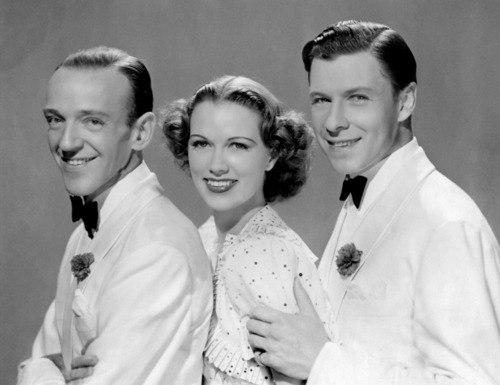



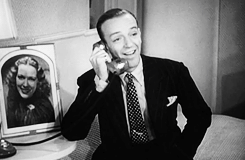

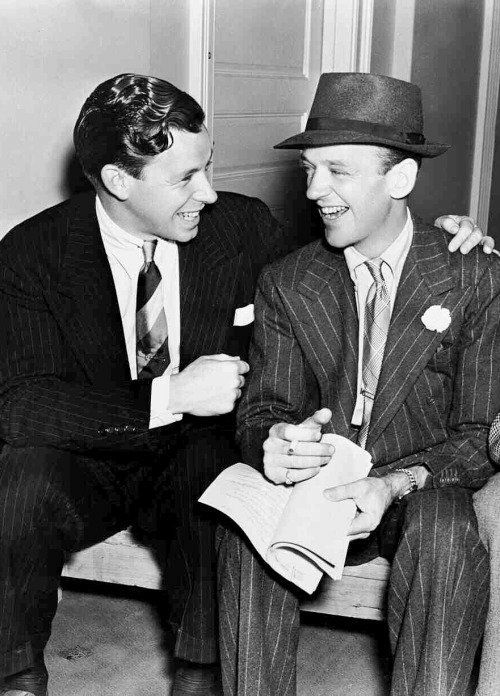

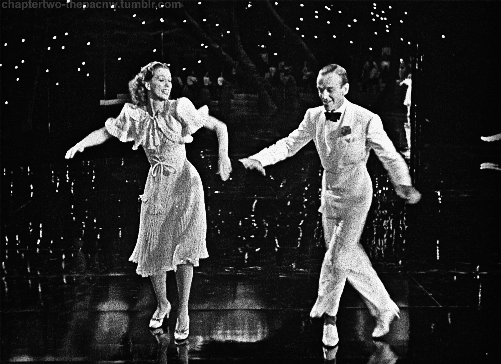
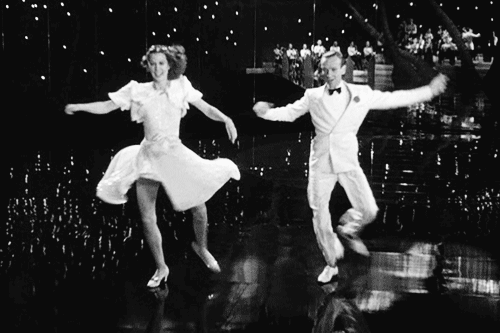
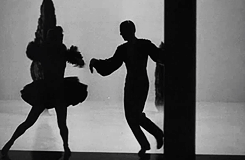
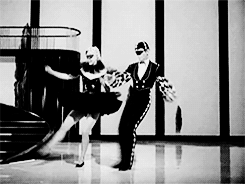

Like you, my introduction to this movie was through That's Entertainment. The part of Begin the Beguine they show in the movie is spectacular, but the entire number is absolutely magnificent.
ReplyDeleteLike you, I believe musicals are made for us to feel, and love would be much poorer without them.
I've seen a bit of this film via "That's Entertainment", but haven't yet had the chance to watch the whole thing./;loiu7y6543q
ReplyDeleteWHOOPS! Premature send. (I was shooing a bug from my keyboard, which explains the weird letters at the end of my comment...)
ReplyDeleteAnyway! I agree, judging by the photos I've seen online, that the film is perfect in black and white. The effect of Astaire and Powell dancing under the stars is gorgeous.
Even though I can't stand Murphy's character, I love this film and Astaire in it. He's just so adorable! Your gifs also reminded me how beautiful the film looks. My mom and I are always saying that black and white cinematography just has that special something that color can't duplicate.
ReplyDeleteHi, Le! This is a great review. I'm glad they shot it in black-and-white, too--it looked very classy (and I first learned about it in That's Entertainment as well. :-) ). One of the other things I really liked about this movie was there was no one using bodily functions as schtick like Melody 36 (sneezing) and Melody 38 (snoring). It made the whole thing a lot more comfortable.
ReplyDeleteThanks so much for joining the blogathon!
Love your opening paragraph describing musicals. I also really love the gif of Astaire smiling. So charming.
ReplyDelete